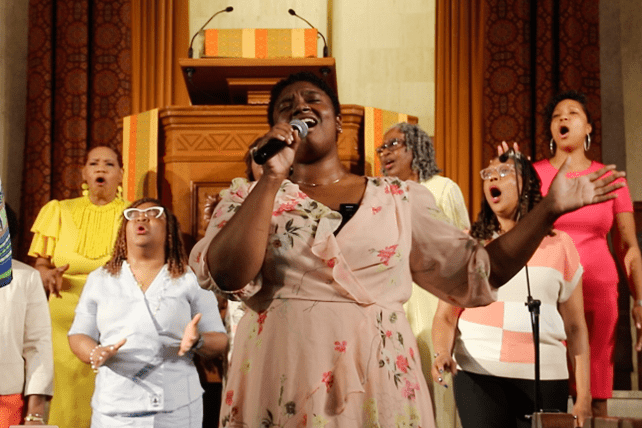Those demographic shifts have hit historically Black Catholic parishes hard. St. Teresa of Avila in Crown Heights, which was the first church in the nation to hold Mass in Creole, will close by the end of the year. The anticipated closure demonstrates a wider pattern of Catholic churches that serve people of color closing, often attributed to declining attendance.
For Mike Delouis, 38, St. Teresa’s longtime cantor and a son of Haitian immigrants who was baptized at the church, the loss is personal.
“Singing for me is not about performance but about participation,” said Delouis, who juggles three services most Sundays between St. Teresa and the Co-Cathedral of St. Joseph in Prospect Heights. “St. Augustine said singing is praying twice.”
In June, from his place in the choir loft, Delouis heard the priest announce the church’s closure. The words hit hard. “It was actually kind of hard to finish,” he said. “We only had the closing hymn to do, and I thought, ‘Oh my gosh, no — we can’t let this happen.’”
Jesteena Walters, 55, has been part of Bedford Central Presbyterian Church in Crown Heights since she was an infant. She began singing at age 6 in the junior choir, and when she turned 18, she transitioned to its Gratitude choir, which her older siblings also joined. “It was the young hip gospel choir of the church,” Walters said.
Today, Gratitude no longer exists in the same way. Its members are older and often reunite only for special occasions, such as singing at funerals. Over the decades, Walters has also watched the congregation itself shift demographics.
“When I first went to Bedford Central, it was primarily a white church, and so we were in the minority at the time,” Walters said, referring to the early 1970s. “In the years that would come, it was primarily a Black church.” It later became home to a large West Indian population, and today includes many members of Guyanese heritage.
“To be honest, I couldn’t break down the history of Brooklyn in a way that says who came first,” Walters said. “At the end of the day, I believe in people coming together, if we can truly connect, feel each other’s pain and celebrate each other’s joys.”
McMillan emphasized that choirs continue to play a central role in Black church life, even as congregations decline in membership. “Choir singers are some of the most faithful churchgoers,” McMillan said. “A choir is a community within the church community, and whenever you have a really consistent and strong choir, they grow with one another.”
Howard said she hopes to become a choir director one day, and she credits McMillan and the gospel choir for encouraging her toward the role.
“I’d like to follow in that tradition,” she said.
This article originally appeared here.


